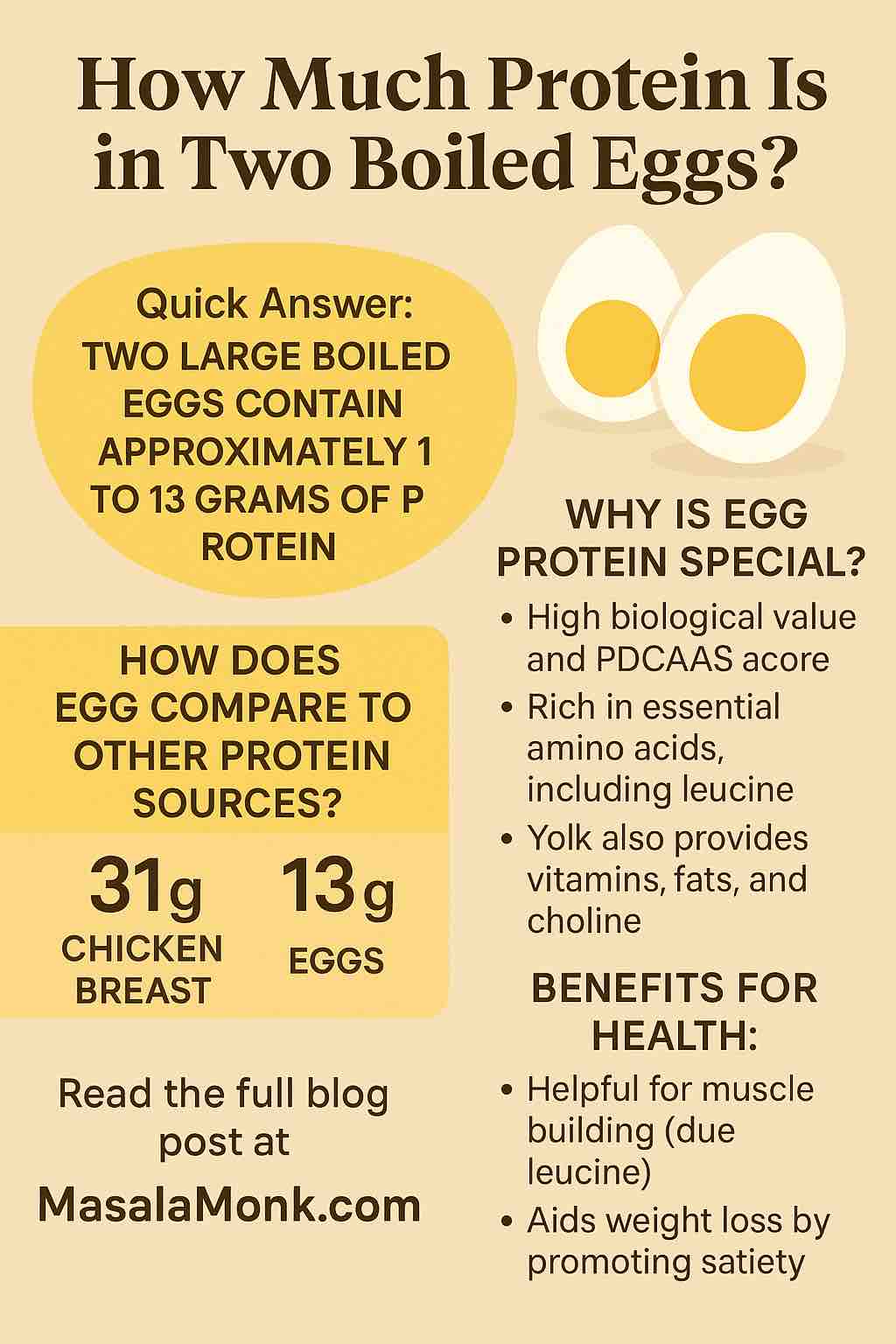
Eggs have long been heralded as a powerhouse of nutrition. Whether you’re a fitness enthusiast, a busy professional, or someone looking for a reliable source of quality protein, boiled eggs are often at the top of the list. But how much protein is really in two boiled eggs? And what makes them such a staple in diets worldwide?
Let’s break it all down — from grams and amino acids to digestibility and practical tips.
Quick Answer: How Much Protein in Two Boiled Eggs?
A single large boiled egg contains approximately 6 to 6.5 grams of protein, depending on size and cooking method. Therefore:
➡️ Two large boiled eggs contain approximately 12 to 13 grams of protein.
But numbers alone don’t tell the whole story. Let’s understand why this protein is valuable, how it compares to other sources, and how you can best utilize it in your diet.
What Makes Egg Protein So Special?
Protein is not just about quantity — it’s about quality, too.
Egg protein is considered a complete protein, meaning it contains all nine essential amino acids in the right ratios your body needs. These amino acids can’t be synthesized by the body and must be obtained from food.
✅ Highlights of Egg Protein:
- High Biological Value (BV): Eggs score a perfect 100 on the BV scale, meaning their protein is highly bioavailable and easily utilized by the body.
- PDCAAS Score: On the Protein Digestibility Corrected Amino Acid Score (PDCAAS), eggs also score 1.0 — the highest possible score, shared with whey and casein.
- Rich in Leucine: Leucine is a key amino acid for muscle protein synthesis, and eggs offer a good dose per serving.
Egg Whites vs. Egg Yolks: Where Is the Protein?
A common misconception is that all the protein is in the egg white. While whites contain a significant portion, the yolk also contributes.
| Egg Component | Protein (approx.) | Other Nutrients |
|---|---|---|
| Egg White | 3.6 grams | Almost no fat; some B vitamins |
| Egg Yolk | 2.7 grams | Fats, vitamins A, D, E, K, and cholesterol |
So, skipping the yolk not only reduces the protein content by almost 45%, but also discards valuable nutrients like choline, vital for brain function.
Protein Needs: How Do Two Eggs Fit In?
The Recommended Dietary Allowance (RDA) for protein is around:
- 0.8g per kg of body weight for a sedentary adult
- 1.2–2.0g per kg for active individuals or athletes
For a 70kg (154 lb) person:
- Basic RDA: ~56g protein/day
- Active needs: up to 140g/day
Two boiled eggs provide ~13g — that’s about 23% of the RDA for a sedentary person, and still a meaningful chunk for athletes as part of a balanced meal plan.
Comparing Eggs to Other Protein Sources
Let’s put eggs into context by comparing with other common protein-rich foods:
| Food Item | Protein (per 100g) |
|---|---|
| Boiled Eggs | ~13g |
| Chicken Breast | ~31g |
| Greek Yogurt | ~10g |
| Tofu (Firm) | ~8g |
| Lentils (cooked) | ~9g |
| Almonds | ~21g (but high fat) |
| Whey Protein (1 scoop) | ~20-25g |
While eggs don’t have the highest protein content by weight, their convenience, completeness, and nutrient density make them stand out.
Boiled Eggs for Muscle Building and Weight Loss
💪 For Muscle Gain:
- Eggs are anabolic-friendly — thanks to leucine and high bioavailability.
- Pairing eggs with resistance training supports muscle hypertrophy.
🥗 For Weight Loss:
- Eggs are filling and score high on the satiety index.
- The fat and protein in eggs help reduce overall calorie intake.
Best Time to Eat Boiled Eggs
- Morning: Protein kickstart to your metabolism.
- Pre/Post Workout: Ideal due to leucine content and digestibility.
- Evening: Great for satiety and overnight recovery.
They’re also a perfect snack — portable, non-messy, and naturally portion-controlled.
Boiled vs. Fried vs. Scrambled: Does It Affect Protein?
Cooking method doesn’t significantly reduce protein, but:
- Frying may add extra fats (depending on the oil used).
- Overcooking can slightly reduce bioavailability.
- Boiling is one of the cleanest methods — no added fat, minimal nutrient loss.
Exploring the Nutritional World of Eggs and Delicious Egg Recipes
Before we delve into the nutritional profiles of various egg preparations, let’s start with a culinary adventure featuring 10 Examples of Egg Dishes with 2 Eggs. This post showcases ten delightful egg dishes prepared with just two eggs each. It offers creative culinary ideas and expands your options for incorporating eggs into your meals, making it a delightful introduction to the world of eggs.
Now, let’s continue our exploration of the nutritional aspects of eggs with the following articles:
- How Much Protein in Two Boiled Eggs: This article emphasizes the high protein content in boiled eggs, detailing their comprehensive nutritional profile, including calories, fats, vitamins, and minerals. It’s a must-read for those looking to understand the full nutritional value of this simple yet powerful food.
- Egg Yolks or Yellow: Nutritional Protein Profile: Focusing on the often-debated egg yolk, this post explores its rich nutrient content, including proteins, vitamins, minerals, and fatty acids. It’s an essential read for understanding the health benefits and culinary uses of egg yolks.
- Calories & Nutrition in Egg Whites: This article delves into the low-calorie and high-protein profile of egg whites, discussing their role in various diets and their versatility in cooking. It’s particularly useful for those interested in weight management and muscle building.
- Protein in 3 Scrambled Eggs: Nutritional Insights and Benefits: Highlighting the protein-rich nature of scrambled eggs, this post provides insights into their caloric and fat content, along with tips for healthier preparation. It’s a great guide for anyone looking to incorporate scrambled eggs into a balanced diet.
These articles collectively offer a well-rounded perspective on the nutritional aspects of eggs, catering to fitness enthusiasts, health-conscious individuals, and culinary aficionados alike. Whether you’re exploring delectable egg dishes, understanding the protein-packed world of boiled eggs, delving into the nutrient-rich yolk, or opting for the lean protein of egg whites, these posts provide valuable information to enhance your dietary choices and cooking repertoire.
Tips to Maximize Protein from Eggs
- Combine with whole grain toast or vegetables for a balanced meal.
- Add eggs to salads, sandwiches, or bowls for an easy protein upgrade.
- Use eggs as a post-workout snack with fruit or a small carb.
Conclusion: Tiny Package, Powerful Punch
So how much protein is in two boiled eggs? Roughly 12 to 13 grams — but that’s just scratching the surface.
What makes boiled eggs a superstar is their nutritional profile, versatility, and efficiency. They’re not just a protein source — they’re a complete, accessible, and budget-friendly superfood that deserves a place in almost every diet.
Whether you’re looking to bulk up, slim down, or just eat cleaner, two boiled eggs might be the simplest and smartest addition to your plate.
FAQs
- What is the exact protein content in two large boiled eggs? Two large boiled eggs typically contain about 13 grams of high-quality protein. This amount can slightly vary depending on the size of the eggs.
- Are boiled eggs good for weight loss? Yes, due to their high protein content and moderate calorie count, boiled eggs can be a great addition to a weight loss diet. The protein helps in keeping you full for longer, reducing the urge to snack.
- Can boiled eggs help in muscle building? Absolutely! The complete protein in boiled eggs, containing all essential amino acids, is crucial for muscle repair and growth, making them a popular choice among athletes and fitness enthusiasts.
- How many calories are in two boiled eggs? Two large boiled eggs contain around 155 calories. The calorie content can be less if you choose to eat only the egg whites.
- Is there a difference in nutritional value between soft and hard-boiled eggs? The cooking method (soft-boiled vs. hard-boiled) does not significantly affect the nutritional value of the eggs, including their protein content.
- Can people on a low-carb or keto diet eat boiled eggs? Yes, boiled eggs are an excellent choice for low-carb and keto diets due to their high protein and fat content and virtually zero carbohydrates.
- How do the fats in boiled eggs impact heart health? Boiled eggs contain mostly unsaturated fats, which are healthier for the heart. However, they also have dietary cholesterol, so individuals with specific heart conditions should consult a healthcare provider.
- What other nutrients do boiled eggs provide besides protein? Boiled eggs are rich in several vitamins and minerals, including Vitamin A, B vitamins, Vitamin D, selenium, and zinc. They are also a source of healthy fats.
- Are boiled eggs suitable for a diabetic diet? Yes, the low carbohydrate content in boiled eggs makes them a suitable option for people managing diabetes.
- How should boiled eggs be stored for maximum freshness? Store boiled eggs in their shells in the refrigerator. They can be kept for up to a week, ensuring they retain their taste and nutritional quality.











